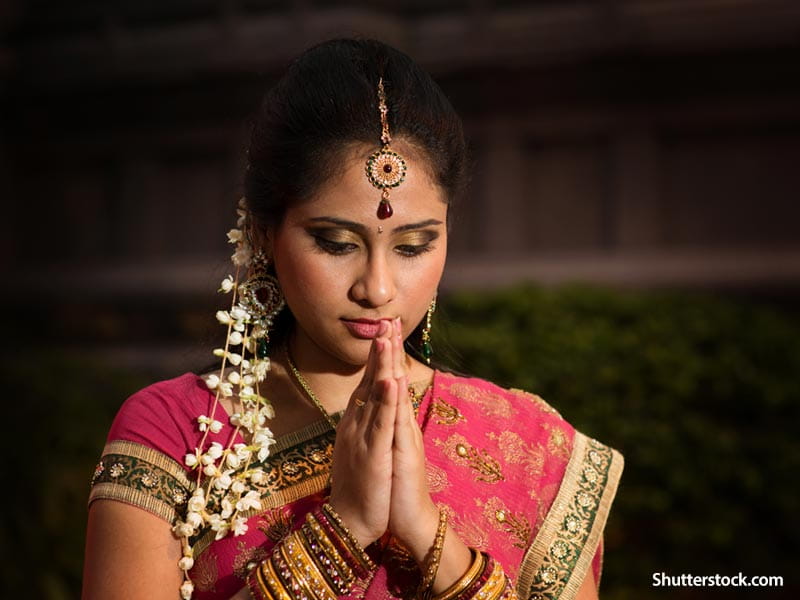According to Hindu scripture, human life begins when the male semen fertilizes the female egg.
karmana daiva-netrena jantur dehopapattaye striyah pravista udaram pumso retah-kanasrayah (SB. 3.31.1)So there is no debate within Hinduism as to when life begins. Thus abortion involves killing, which in most cases is not acceptable. Although I have not studied the argument, it is likely that on similar grounds Hinduism would oppose stem cell research, which as I understand it is most effectively done on the stem cells of aborted fetuses.
"By divine arrangement in accordance with the principle of karma, the living entity enters into the womb of a woman through the particle of male semen to assume a particular type of body."
Oftentimes the women in my family are not allowed to go to the temple, practice pujas, or even go into the kitchen when they have their menstrual period. When I was in India, my aunt said she was "cursed" because she always got her period during important festivals, and could not participate in the ceremonies. Although it may have been hygienic in the olden days, now it seems pretty useless--after all, there are clean and sanitary ways to handle the situation. I would like to know where it states (in Hinduism) that women are not allowed to do anything during their period? And why do we continue to practice this seclusion even in these days; after all, isn't the menstrual cycle (which allows a woman to procreate) one of the most natural and important of bodily functions?
Prohibitions regarding women's involvement in ritualistic worship during their menstrual cycle are implied throughout the scripture. At least this is how those who have formed lineages have interpreted sections of the scripture that discuss this period. The Bhagavata Purana for example attributes the menstrual cycle to one fourth the karmic reaction to Indra's inadvertent killing of a brahmana. According to that Purana, Indra killed a brahmana and was then chased by the karmic reaction to this killing. He then negotiated with four groups who each agreed to absorb one quarter of the reaction in exchange for a blessing. Women got the blessing that they could have sex during pregnancy without endangering the embryo in exchange for accepting the monthly menstrual cycle.
sasvat-kama-varenamhas turiyah jagrhuh striyahIt is also stated in this Purana that one should not eat food seen by a woman during her monthly period, bhunjitodakyaya drstam (BP. 6.18.49). You may also find something about this in Manu Samhita.
rajo-rupena tasv amho masi masi pradrsyate (BP. 6.6.9)
Hindus may submit questions for the swami to editor@swami.org. Non-Hindus with questions on Hindu basics or etiquette (such as "What do I wear to a Hindu wedding?") are invited to submit them to columnists@staff.beliefnet.com.
The latter seems more likely, and one merely needs to read up on the varied fears premodern cultures had about this period in a woman's life to know that their understanding involved considerable superstition. Hindu culture is no exception. Indeed, even the most orthodox Hindus have altered their position on this issue in today's world, while for the most part holding on to some part of premodern thinking about it with regard to ritual purity. Thus while Hindu women are no longer confined to solitude, and the clothes worn during their monthly cycle are no longer burned, they are often prohibited from ritual worship and even entering the temple. In my opinion, it is likely that these current prohibitions will also be lifted in time. The main concern in Hinduism seems to be with regard to bleeding, as even men who are bleeding from any particular ailment are not allowed to participate in ritualistic worship. However, today the question remains as to whether modern methods of cleanliness that control bleeding do not change the equation.
In my particular lineage, there is already a difference of opinion. Visvanatha Cakravarti Thakura states in his Bhagavad-gita commentary on Bg. 9.26 that the word prayatatmanah refers to physical purity and thus prohibits women from engaging in temple worship during their menstrual period. But my own guru considered that such worship did not contradict the guidelines outlined by the lineage's founders. In this regard he wrote, "According to the smarta viddhi, women cannot touch the Deity during their menstrual period, but the goswami viddhi allows. But it is better not to do it. One thing is that the seva can never be stopped for any reason. This also for the cooking." (Here Prabhupada implies that women can do these services for the Deity during their menstrual cycle if necessary.)
In the bhakti tradition, God is more accessible, especially Krsna. However, overall in this age (Kali-yuga) the most effective spiritual practice is chanting God's names, and there are no prohibitions for Krsna kirtana. Such chanting can be performed by anyone at any time under any circumstance.

